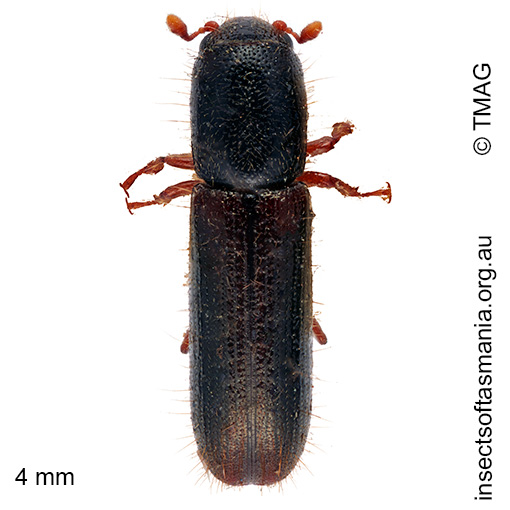
Teredolaemus leai (a species of cocoon-forming beetle)
Basis for Tasmanian occurrence
Semmens, T.D., McQuillan, P.B. & Hayhurst, G. (1992). Catalogue of the Insects of Tasmania. Government of Tasmania: Department of Primary Industry, 104 pp.
TMAG collections
Classification
Order: Coleoptera
Suborder: Polyphaga
Superfamily: Coccinelloidea
Family: Teredidae
Subfamily: Teredinae
Morphology
Flightedness: winged and assumed capable of flight
Source literature on morphology and taxonomy (*primary taxonomic source, where identified):
Lawrence, J.F. (1985). The genus Teredolaemus Sharp (Coleoptera: Bothrideridae) in Australia. J. Aust. Entom. Soc. 24: 205-206.
Zhou, Yu-Lingzi, Nathan P. Lord & Stanisław A. Ślipiński. (2017). Review of the Australian Teredolaemus Sharp, 1885 (Coleoptera: Teredidae), with descriptions of five new species. Austral Entomology 56(4): 439-450.
Ecology
Assumed larval feeding: predator
Association with dead wood or old trees: obligately saproxylic
Ecological attributes: — Nothofagus cunninghamii is a host-plant (Bashford, 1990a) — May occupy logs or trunks of Eucalyptus obliqua, at least temporarily, since found having emerged within six years of felling (Grove et al., 2009).
Collection method(s) for TFIC material: — Emergence trapping from cut billets of Eucalyptus obliqua (Harrison, 2007) — Emergence trapping from log of Eucalyptus obliqua — Hand collection (substrate not specified) — Pitfall trapping — Sticky trapping (substrate not specified) — Sticky trapping on Eucalyptus obliqua — Vane trapping.
Source ecological literature:
Bashford, R. (1990a). Tasmanian forest insects and their host plants: records from the Tasmanian Forestry Commission insect collection. Hobart: Tas. Forestry Commission, 32 pages.
Grove, S. et al. (2009). A long-term experimental study of saproxylic beetle … succession in Tasmanian Eucalyptus … logs… In: Fattorini, S. (Ed.), Insect Ecology and Conservation. Research Signpost, pp. 71-114.
Harrison, K.S. (2007). Saproxylic beetles associated with habitat features in Eucalyptus obliqua trees in the southern forests of Tasmania. PhD thesis, Dept. of Zoology, Univ. of Tasmania, Hobart.

